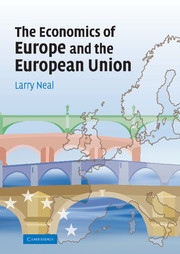Book contents
- Frontmatter
- Contents
- List of figures
- List of tables
- List of boxes
- Part I The economics of the European Union
- 1 Old Europe, new Europe: the role of the European Union
- 2 A dispute over origins: the European view versus the American perspective
- 3 The customs union and the diversion of trade
- 4 The Common Agricultural Policy and reforms: feeding Europe and then some
- 5 The euro: the ultimate currency reform?
- 6 The European Central Bank in action
- 7 The single market: from eliminating non-tariff barriers to enforcing competition
- 8 The single market in labor: from refugees to Schengen
- 9 The single market in capital: from Bretton Woods to Maastricht
- 10 The EU inside and out: regional policy and development aid
- 11 The EU: the other economic superpower?
- Part II The economies of Europe
- Suggestions for further reading
- Index
3 - The customs union and the diversion of trade
Published online by Cambridge University Press: 05 September 2012
- Frontmatter
- Contents
- List of figures
- List of tables
- List of boxes
- Part I The economics of the European Union
- 1 Old Europe, new Europe: the role of the European Union
- 2 A dispute over origins: the European view versus the American perspective
- 3 The customs union and the diversion of trade
- 4 The Common Agricultural Policy and reforms: feeding Europe and then some
- 5 The euro: the ultimate currency reform?
- 6 The European Central Bank in action
- 7 The single market: from eliminating non-tariff barriers to enforcing competition
- 8 The single market in labor: from refugees to Schengen
- 9 The single market in capital: from Bretton Woods to Maastricht
- 10 The EU inside and out: regional policy and development aid
- 11 The EU: the other economic superpower?
- Part II The economies of Europe
- Suggestions for further reading
- Index
Summary
The most important aspect of the enlargement of the European Union in 2004 is the expanded market for trade among the member countries that has been created. Further, trade will not be limited to just coal and steel, or manufactured goods, or agricultural goods, as was the case in the European Union as it gradually opened up trading opportunities within western Europe over the decades following the end of World War II. After a reasonably short transition period of adjustment, ranging from five to seven years, depending upon the country and the policy issue, all ten accession countries will be open to, and have opened to them, trade not only in goods but in services, of labor, and of capital, all regardless of nationality. That is the consequence of agreeing to take on the entire acquis communautaire of the European Union that has gradually accreted over the past half-century. The economic consequences for the original members and the subsequent entrants have been enormously beneficial; the central and eastern European countries hope that, by leapfrogging over the intermediate stages of institutional adjustments that their western neighbors labored through, they can achieve comparable economic prosperity in a much shorter time. In response to this prospect, the accession countries have already made dramatic structural changes within their economies, expecting that by imitating the economic practices of the western EU countries they will generate rapid economic progress for themselves and their citizens.
- Type
- Chapter
- Information
- The Economics of Europe and the European Union , pp. 41 - 63Publisher: Cambridge University PressPrint publication year: 2007



